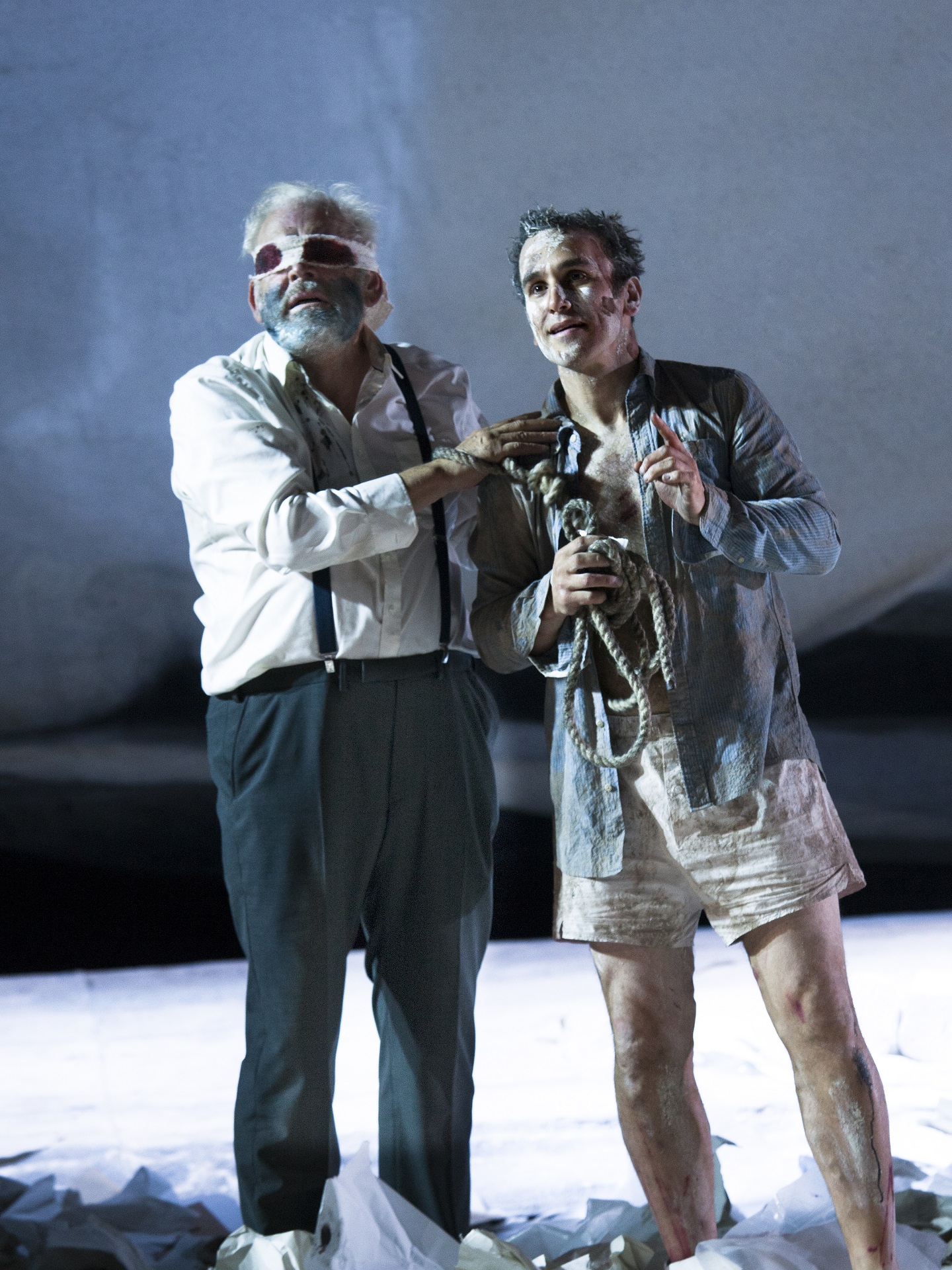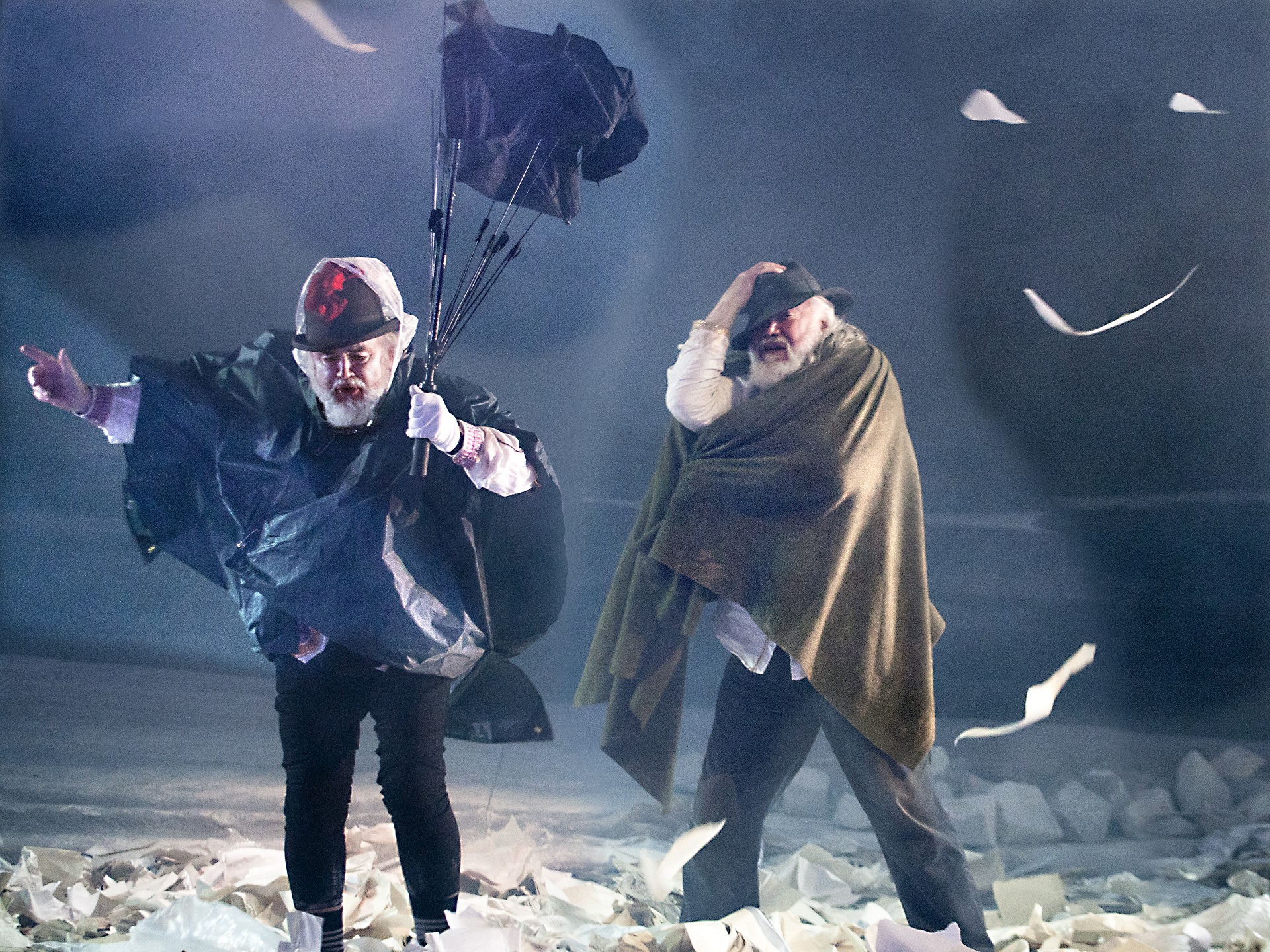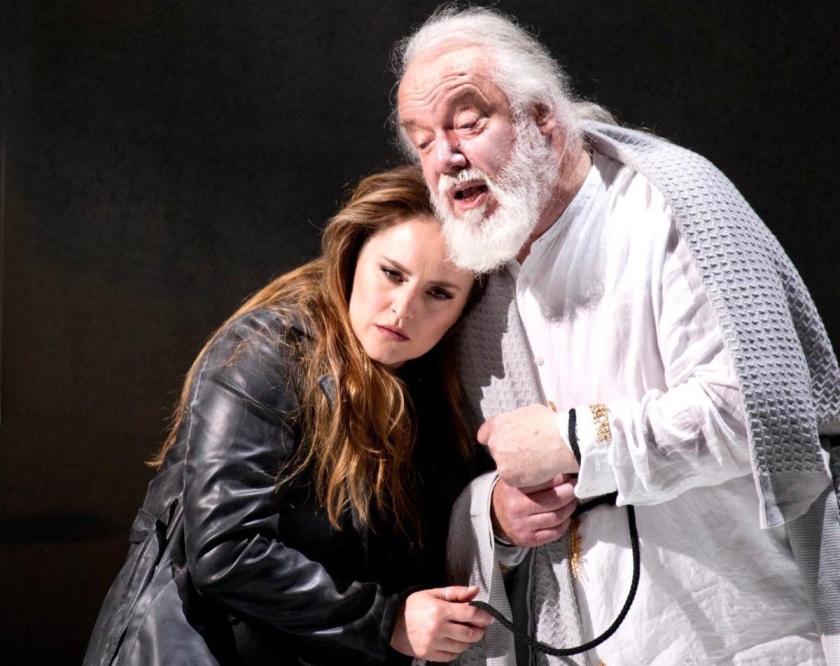Much has been made of the raison d’etre for this King Lear as the slowly gestated, Covid-delayed brainchild of the director Keith Warner, assembling a company of acting singers who have made their names on the opera stage. How this played out on the first night, in the first half of a fairly full text, was a reluctance to hold the stage on the part of everyone except John Tomlinson’s Lear, a tendency to rush lines without the bridle and support of a musical texture, and an excessive mindfulness of others around them as though plotting their way through a Mozartian act finale.
Music is shrewdly cut to the bone, as if to quell any fear that the casting would elicit some ill-born singalong tragedy. The material of Nigel Osborne’s score has been composed from the cast’s recorded voices, its offbeat bluesy mood oddly reminiscent of a Dennis Potter soundtrack. The unspecific modernity of the setting is recognisable from Warner’s stagings of the Ring and Wozzeck. We are wherever the characters are; they make their own world. The noise of civil war is left off-stage; political resonances we may sound for ourselves. Warner’s most striking intervention is the irregular presence of John Graham-Hall as a named “Old Gentleman” but also an unscripted observer, standing by with mysterious, potentially authorial intent.  Familiar too is the director’s key-note of heightened naturalism making sense of a text and characters crossing back and forth between lucidity and madness. Kim Begley’s Fool is no owlish riddler but an old servant on boldly equal terms with his king (hard not to think in this context of Begley playing Gurnemanz, Tomlinson’s old signature role, to the Amfortas of Lear). He is accommodated as Lear and Gloucester are not to the paper-thin curtain between life going for and against you. Meanwhile, Anthony Flaum (pictured above with Thomas Allen's Gloucester) makes of Edgar a fascinating study in what could happen if we took him at his appearance, if Mad Tom were no act but a descent from which recovery becomes the necessary making of his slow, tentative steps towards leadership.
Familiar too is the director’s key-note of heightened naturalism making sense of a text and characters crossing back and forth between lucidity and madness. Kim Begley’s Fool is no owlish riddler but an old servant on boldly equal terms with his king (hard not to think in this context of Begley playing Gurnemanz, Tomlinson’s old signature role, to the Amfortas of Lear). He is accommodated as Lear and Gloucester are not to the paper-thin curtain between life going for and against you. Meanwhile, Anthony Flaum (pictured above with Thomas Allen's Gloucester) makes of Edgar a fascinating study in what could happen if we took him at his appearance, if Mad Tom were no act but a descent from which recovery becomes the necessary making of his slow, tentative steps towards leadership.
"O, let me not be mad, not mad!" Tomlinson carves out of Lear’s banter with his Fool a rare and appalling point of stillness in the first half: here was both taken and shared some crumb of confidence that the king does, in fact, still have his wits about him. The moment also establishes a wavering assurance that madness will never fully claim him. A sudden, catastrophic yielding of temper is a Shakespeare trick long in the honing, and Tomlinson accomplishes the disowning of Cordelia with the imperial fiat of a Boris Godunov, to which Goneril (Susan Bullock) and Regan (Emma Bell) respond with a practised ease. To play King Lear straight is no small achievement. Emotions are worn on the skin of the text like wounds, as though everyone has already but imperfectly taken heed of Edgar’s final and hopelessly unreal first decree as king to “speak what we feel, not what we ought to say”. In other words, be more like Cordelia.  In the theatre fashioned from the Palladian splendour of The Grange, too little could be made of the final scene between Lear and Louise Alder’s beautifully observed Cordelia, disadvantaged from upstage. Even with his superlative diction and feel for the poetry as well as the fractured oratory of the king, Tomlinson fought and lost a battle in the storm scene (pictured above with Kim Begley) with a busy wind machine, assorted moanings and groanings from the soundtrack, and a paper-strewn heathland which thwarted intelligibility throughout the show’s second half: symbolically pregnant with words and promises trampled underfoot, perhaps, and practical in one sense as the stuff to suit a tour which the staging richly deserves, but also a tiresome, rustling interference like medium-wave radio.
In the theatre fashioned from the Palladian splendour of The Grange, too little could be made of the final scene between Lear and Louise Alder’s beautifully observed Cordelia, disadvantaged from upstage. Even with his superlative diction and feel for the poetry as well as the fractured oratory of the king, Tomlinson fought and lost a battle in the storm scene (pictured above with Kim Begley) with a busy wind machine, assorted moanings and groanings from the soundtrack, and a paper-strewn heathland which thwarted intelligibility throughout the show’s second half: symbolically pregnant with words and promises trampled underfoot, perhaps, and practical in one sense as the stuff to suit a tour which the staging richly deserves, but also a tiresome, rustling interference like medium-wave radio. Even so, the steady, unfathomable goodness of Donnie Ray Albert’s Kent shone through as the pole star to the bounding, amoral vigour of Oskar McCarthy’s Edmund (pictured above). The finding of something lost is another leitmotif of later Shakespeare; to that end, not the least of the tragedy’s many themes in this richly personal staging emerged as the contrasting journeys through fatherhood undertaken by Tomlinson’s Lear and Thomas Allen’s Gloucester, so nobly blind before he is blinded, so slow to cast off the trappings of dignity. In their final scene together arrived the staging’s climax of unforgettable pathos – “Reason in madness” as the onlooking Edgar remarks – shot through with unresigned frailty and the shared history of their decades as Wagnerian sparring partners.
Even so, the steady, unfathomable goodness of Donnie Ray Albert’s Kent shone through as the pole star to the bounding, amoral vigour of Oskar McCarthy’s Edmund (pictured above). The finding of something lost is another leitmotif of later Shakespeare; to that end, not the least of the tragedy’s many themes in this richly personal staging emerged as the contrasting journeys through fatherhood undertaken by Tomlinson’s Lear and Thomas Allen’s Gloucester, so nobly blind before he is blinded, so slow to cast off the trappings of dignity. In their final scene together arrived the staging’s climax of unforgettable pathos – “Reason in madness” as the onlooking Edgar remarks – shot through with unresigned frailty and the shared history of their decades as Wagnerian sparring partners.















Add comment